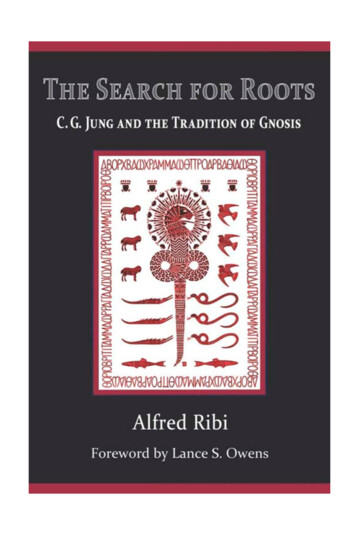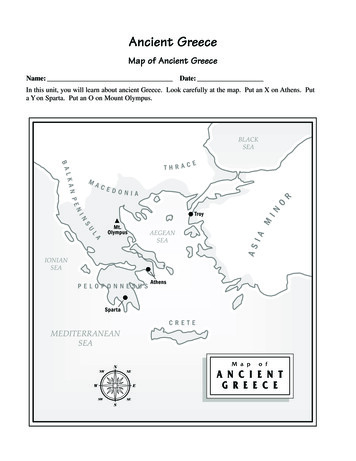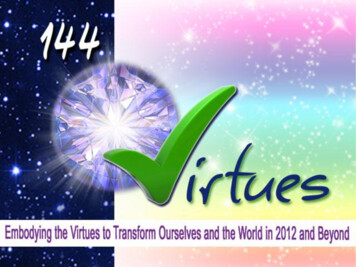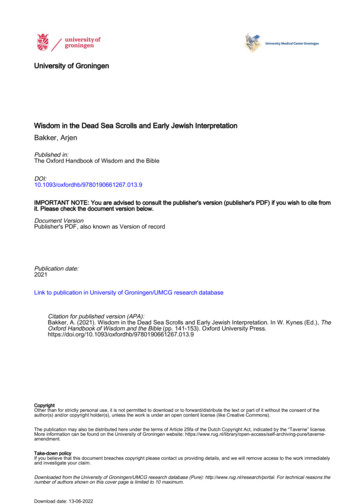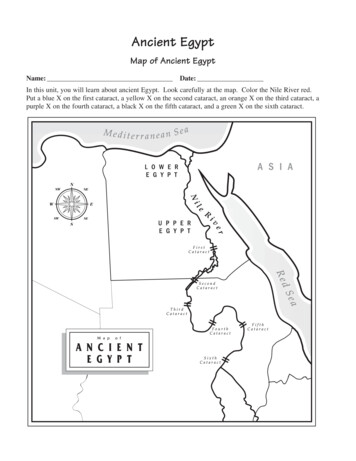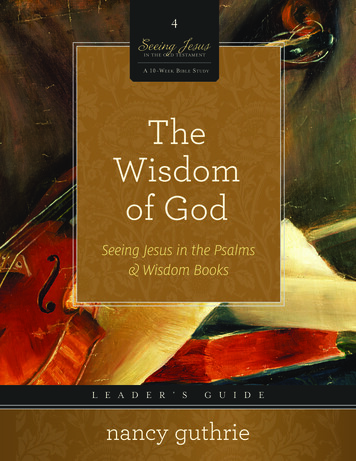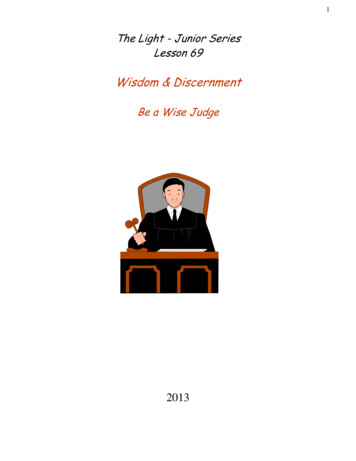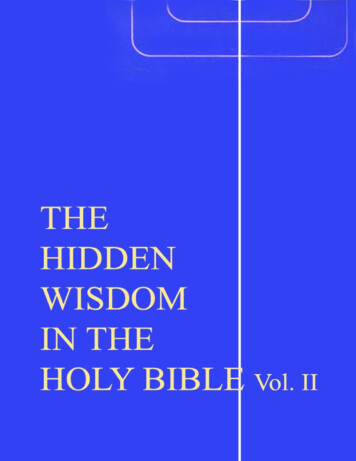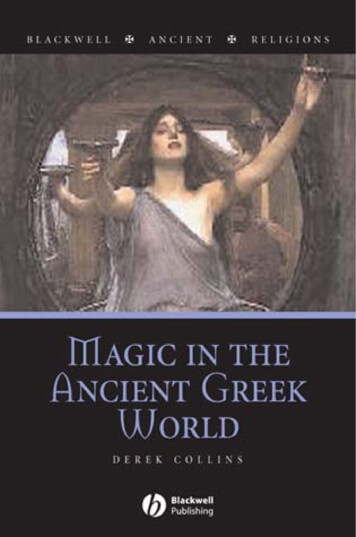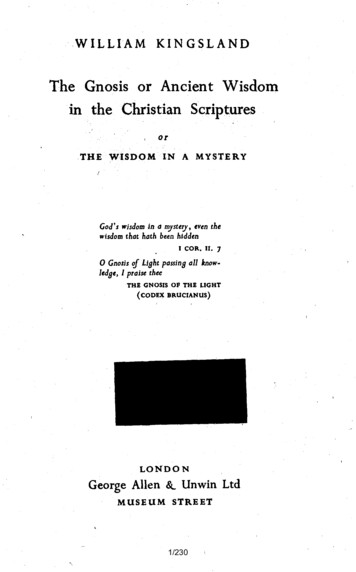
Transcription
WILLIAM KINGSLANDThe Gnosis or Ancient Wisdomin the Christian Scripturesor,THE WISDOM IN A MYSTERYGod's wisdom in a mystery, even thewisdom that bath been hiddenI COR. II . 70 Gnosis of Light passing all knowledge, I praise theeTHE GNOSIS OP THE LIGHTCODEX BRUCIANUS)LONDONGeorge Allen & Unwin LtdMUSEUM STREET1/230
FIRST PUBLISHED IN 1 937.SECOND IMPRESSION 195THIRD IMPRESSION 195tPRINTED IN GREAT BRITAINBY BRADFORD AND DICKENSLONDON, W .C.I2/230
The Gnosis or Ancient Wisdomin the Christian Scriptures3/230
BY THE SAME AUTHORTHE MYSTIC QUEST.1891 .THE ESOTERIC BASIS OF CHRISTIANITY .SCIENTIFIC IDEALISM .1909 .THE PHYSICS OF THE SECRET DOCTRINE .OUR INFINITE LIFE . 1922 .RATIONAL MYSTICISM . 1924 .1895 .1910 .AN ANTHOLOGY OF MYSTICISM . 1927.THE REAL H . P. BLAVATSKY . 1928 .CHRISTOS, THE RELIGION OF THE FUTURE . 1929 .THE GREAT PYRAMID IN FACT AND IN THEORY .PART I. 1982.PART II. 1935 .THE ART OF LIFE AND HOW TO CONQUEROLD AGE . 1984 .4/230
EDITOR'S PREFACETHis book is the last work of the late William Kingslandand is published under the auspices of "The KingslandLiterary Trust ." This Trust was inaugurated by the authorshortly before his death, and is by his wish composed of theCouncil of the Blavatsky Association, who are therebyempowered to publish his MSS. at their discretion .The "Gnosis" had occupied much of Kingsland's time andthought during the last two years of his life, and was notcompleted , until 'shortly before his death ; he had, indeed,hoped to make a few alterations to the manuscript but didnot live to do so, and except for the correction of sometypist's errors it is published as it left the author's hand .In this work Kingsland shows how the fundamental teachings given to the world at the beginning of the Christianera were derived from the Gnosis or Ancient Wisdom, but intime have become so perverted that the modern interpretation of Christianity represents merely their debased survival .It should be mentioned that the author's title for thiswork was The Gnosis in the Christian Scriptures, which theTrust altered to its present form.The cost of the publication has been met by many friendswhom William Kingsland had helped to a truer concept of therealities of life through his deep understanding of the AncientWisdom . The contributors have been glad to assist in theproduction of this work as a memorial to one whom theyregard with enduring gratitude and affection .THE KINGSLAND LITERARY TRUST26 BEDFORD GARDENS, LONDON,November 19365/230w,8
CONTENTSCHAPTER:Aas7Editor's Preface11IntroductionI.II .RELIGION AND RELIGIONSTHE BIBLEIII .THE ANCIENT WISDOM OR GNOSISIV .THE GENESIS NARRATIVEV.THE NEW TESTAMENT SCRIPTURESI. THE GOSPELSVI.THE NEW TESTAMENT SCRIPTURESII. PAUL'S EPISTLESVII .PRACTICAL 9228
THE GNOSIS OR ANCIENT WISDOMIN THE CHRISTIAN SCRIPTURESINTRODUCTIONTHIS work is written mainly for a class of readers. and studentswho find themselves altogether out of touch with " Christianity " in any of its current doctrinal or sacerdotal forms,but who, notwithstanding this, have some more or lessclear apprehension that behind those forms, and in theChristian Scriptures themselves, there lies a, deep spiritualtruth, a real Gnosis (Gr. knowledge) of Man's origin, nature,and destiny which has simply been materialized by theChurch in the traditional interpretation of those Scripturesbased upon their literal acceptation.Not that one does not recognize that even in its mostirrational and unacceptable dogmas, so-called " Christianity "makes an appeal to a certain class of minds ; and, indeed,is perhaps the only form of "religion " which could makeany appeal to that particular class.However irrational Christian dogmas may be in the lightof our modern knowledge-and still more so in the light ofthe deeper knowledge of the Gnosis-they do, if ,genuinelybelieved in, serve to keep the average individual more orless on a straight path of moral rectitude, and they affordhim a certain amount of. comforting assurance that he isnot " a lost sinner " ;whilst in some cases they are undoubtedlythe inspiring beliefs giving rise to noble and self-sacrificinglives . Precisely the same- may be said, however, of otherreligions which differ radically from Christianity, in theirformulated beliefs . In short, the evidence of the life ofan individual is no proof of the truth of his creed . It issufficient that he believes in it ; the rest is mere psychology.The One Spirit overshadows and works in all, but the formin which that working is presented through the mind orintellect is a matter of the psychological make-up of theindividual, the lower personal self with its heredity, conven137/230
12THE GNOSIS IN THE CHRISTIAN SCRIPTUREStions, and environment . Thus Krishna, speaking on theSupreme Spirit in Bhagavad Gitd, says :"In whatever form a devotee desires with faith to worship, it isI alone who inspire him with constancy therein, and depending on thatfaith he seeks the propitiation of that God, obtaining the object of hiswishes as is ordained by me alone ."'A general recognition of this principle would put an end toall religious intolerance .It is no part of my task in this work to set forth the numerousreasons which can be given for the rejection of the traditionalbeliefs which have hitherto constituted what is generallyknown as " Christianity ." That rejection is becoming moreand more in evidence as knowledge increases, whilst in theChurch itself-using the term Church to cover all and everyChristian community-we have the greatest possible differences of opinion regarding the truth of both " facts " anddoctrines which for centuries have been regarded as the veryfoundations of the " Faith " : e.g. miracles, the virgin birth,original sin, the atonement, the resurrection, the ascension,the second coming, the nature of the eucharist, and the clausesof the Athanasian and other Creeds . Concerning each andall of these, leading authorities in the Church itself areto-day hopelessly at variance, 2 whilst very few professing layChristians are aware to what an extent the commonly receivedconceptions as to the origin of Christianity, based on thesupposed historical veracity of the Gospel narratives, are inquestion to-day by those scholars who have made the closeststudy of the actual historical evidences.But although I am not dealing directly with these controversies, -one cannot ignore them altogether, and some referencesmust necessarily be made to them . Moreover, the correspondence of the Bible allegories with .those of the earlierMystery Cults, such for example as those of Orpheus and ofMithra, as also those of more ancient Egyptian and Aryansources, implies some historical connection in origins ; anddalthough this is exceedingly obscure owing to the destruction1Chapter viz.Those who wish to consult actual statements may read with profit TheChurches and Modern Thought, by Vivian Phelips (see Bibliography, p . 221) .8/230
INTRODUCTION13by the early Church creed-makers of every particle of evidenceof this connection which they could lay their hands on, manyclues still remain to which some allusion must be made .This present work, therefore, is not written for controversialpurposes, or for the purpose of upsetting the " faith " ofanyone, whatsoever that " faith " may be . I am not concerned to convince or convert anyone to the views hereinexpressed. In matters of fact I stand open to correctionwhere I may possibly be in error . But those who have cometo some apprehension of the fact that Christianity in itstraditional form is not merely open to many objections onrational grounds, but also that it is only one of a number offormulated religions which are just as efficacious as itself forthe " salvation " of the individual, cannot adopt the proselytizing spirit which is such a marked feature of " Christianity ."In so far as " Christianity " is exclusive, dogmatic, proselytizing, I am its, perhaps somewhat bitter, opponent . Whenit dares to say that the individual can be " saved " onlyby believing in what it teaches about a certain historicalcharacter, I say that the good Jew, or Buddhist, or Moslem,or Parsi has just as good a chance-nay, in many cases abetter chance-of being " saved " than thousands of professing Christians .What I do offer here is something much more universalthan that of any exclusive religion, i .e. certain principleswhich have been given out by various great teachers fromtime to time in a form appropriate to the age and people towhom they were addressed. These, however, have subsequently been largely overlaid and obscured by the feebleunderstanding and individual interests of partisans . As Ishall presently show, there is no greater example of this thanin so-called " Christianity ."While, therefore, I have no desire to turn anyone asidefrom their present " faith " : recognizing as I do that that" faith " must necessarily suffice to meet the present needsof the individual : it is possible that those who have encased.themselves in a hardened shell of what they call "truth,"based on supposed historical facts as given in the literal wordof Scripture, may hereby get some glimpse of the inadequacy9/230
14'THE GNOSIS IN THE CHRISTIAN SCRIPTURESof their hitherto cherished beliefs ; and of a deeper knowledgewhich has always been available ; aye, even to that supremeknowledge which confers god-like powers on its possessor .It is useless to offer this deeper knowledge to those who havenot perceived the limitations of what they already possess .That may and does suffice for their present needs ; but sooneror later they must come up against facts and experienceswhich will shake them out of their present contentment,and make them realize that for all their assurance of" salvation " they are still very far indeed from the ultimategoal of spiritual knowledge and freedom . It is only the manwho knows how little he knows, and the necessity of knowingmore if he would escape from the present deplorable conditionof mankind, and recover his divine birthright as a " Son ofGod," who can, or will, reach out for that supreme knowledge,that " pearl of great price " which can be obtained only whenhe has " sold all that he had."' Of this more hereafter; butI may remark here that this and other similar parables clearlyshow Jesus to have been an Initiate in the Ancient Wisdomor Gnosis .It is my endeavour now to show how that supreme knowledgewhich I am here referring to as the Ancient Wisdom or Gnosisis embodied in the Christian Scriptures, albeit sadly overlaidwith " the precepts and doctrines of men ."I am not using the term Gnosis as applying merely to thetenets of certain Gnostic sects which were more or less inevidence in the early centuries of the Christian era, but I amusing it in connection with a definite super-knowledge whichcan be traced back to the remotest ages and the oldest Scriptures of which we have any literary records, and which wastaught by Initiates, Adepts, and Masters of the Ancient Wisdomin the inner circles of those Mysteries and Mystery Cults whichare known to have existed in Egypt and elsewhere, even inremotest times . That is the sense in which the term wasoriginally understood . It is the mystic knowledge whicheffects regeneration, rebirth into the full consciousness ofone's divine nature and powers as a " Son of God ."The Gnostic Sects of the early Christian centuries who were1Matt. xiii . 4s.10/230
INTRODUCTION15so virulently attacked by some of the dogma-making Church" Fathers," derived their teachings from these Mystery Cults,but at the same time many of them claimed the ChristianScriptures-though not the afterwards recognized canonicalBooks only-as an authority for their teachings ." However much the Gnostics may have been indebted to heathenthought, they still wished and meant to be Christians, and indeedset up a claim to possess a deeper knowledge of Christian truth than thePsychici of the Church . Like their opponents they also appealed toScripture in proof of their peculiar doctrines. Nay, it would evenseem that the Gnostics were the first to make for that purpose a profitable appeal to the Scriptures of the New Testament . And besides this,they also boasted to be in possession of genuine apostolical traditions,deriving their doctrines, some from Paul, others from St. Peter, andothers again from Judas, Thomas, Philip, and Matthew . In addition,moreover, to the secret doctrine which they professed to have receivedby oral tradition, they appealed also to alleged writings of the apostlesthemselves or their disciples ."'" We have no reason to think that the earliest Gnostics intended tofound sects separated from the Church and called after their own names .Their disciples were to be Christians, only elevated above the rest asacquainted with deeper mysteries, and called yvwaru cdc becausepossessed of a Gnosis superior to the simple faith of the multitude ."" Gnosticism desired only to add to the confession of Faith for theivxucdc a secret doctrine for the svev,uarucd& ."3Gradually, however, as " Christian " doctrine becamehardened and ,more and more dogmatic, and the governmentof the Church fell into the hands of prelates ambitious forworldly power, and quarrelling among themselves forprecedence, this higher knowledge became a heresy, andwhat records are left of it are mainly the misrepresentationsof its bitter opponents among the Church " Fathers."The Essenes, to which community Jesus probably belonged, 4were certainly Gnostics in the sense in which I am here usingthe term . Also the writings of Philo show clearly that hewas acquainted with this Gnosis, although it does not appearthat any of the communities of his time had yet begun to' Smith and Wace, Dictionary of Christian Biography, art . " Irenaeus,"vol. iii, p . 269.' Ibid ., art. " Gnosticism," vol . ii, p . 679.' Ibid., art. " Manicheans," vol . iii, p. 797.' See p. 150 infra .11/230
16 THE GNOSIS IN THE CHRISTIAN SCRIPTURESbe called Gnostics. He was contemporary with Jesus, yetnever mentions him, although he teaches the doctrine of theLogos as the " Son of God ."" Wherever we meet with the word Logos, we know that we have todeal with a word of Greek extraction . When Philo adopted that ward,it could have meant for him substantially neither more nor less thanwhat it had meant before in the schools of Greek philosophy . Thus,when the ideal creation or the Logos had been called by Philo the onlybegotten or unique son (vlds . yovoyevils), the Son of God (V[65 eov),and when that name was afterwards transferred by the author of theFourth Gospel to Christ, what was predicated of him can only havebeen in substance what was contained before in these technical terms, asused at first at Athens and afterwards at Alexandria? (See p .177 infra.)It would appear that among some of the sections of the earlyChristian Church-and it must not be supposed that eventhe earliest " Church " was one and undivided as a communityor in doctrine-the practice common to all the genuine Gnosticcults was followed in having at least three degrees of membership or initiation . It was only in the highest degree that thedeepest " mysteries " were orally communicated ; and even soit was never the case that the Initiate, the Adept, the Mastercould be made by any communicated instruction . He isnot made, he becomes . He must know of the truth of thecommunicated teaching from his own actual experience .What was committed to writing was never more than exoteric .It is just as great a mistake to harden the symbolism of theGnostic Scriptures into a definite theogony or cosmogony asit is to construct an anthropomorphic theology from thenarratives of the Old or New Testaments . The real Gnosis,therefore, is a mystical knowledge and experience transcendingthat appearance of things which the ordinary individualaccepts as the only " reality ."It is my contention in this work not merely that this ancientGnosis did and does exist, and was represented to some extentin the teachings of these Christian Gnostic sects, but alsothat their claim " To possess a deeper knowledge of Christiantruth than the Psychici of the Church " is one which must besustained . In fact, that the traditional dogmas of the Churchwhich have come down to us through the centuries are gross1 Max Miiller, Theosophy or Psychological Religion, p . 403.12/230
INTRODUCTION17materialization of the real teaching as to the spiritual natureand origin of Man as contained in the Gnosis. These dogmasare the result of the literal historicizing of narratives-in somecases, however, having a semi-historical basis-which wereoriginally intended as allegories covering deep spiritual truths .The real fact, therefore, is not that Gnosticism was a" heresy," a departure from the true " Christianity," butprecisely the opposite, i .e. that Christianity in its dogmaticand ecclesiastical development was a travesty of the originalGnostic teachings.'Dean Inge comes fairly near to this view in his work onChristian Mysticism, Appendix B, " The Greek Mysteries andChristian Mysticism ." Thus he says (p . 850) :" A doctrine is not necessarily un-Christian because it is Greek' or Pagan : I know of no stranger perversity than for men who rest thewhole weight of their religion upon history' to suppose that our Lordmeant to raise an universal religion on a purely Jewish basis ."How much Christianity really owes to Pagan " sources hesays is difficult to ascertain by reason of " the loss of documents,and by the extreme difficulty of tracing the pedigree of religiousideas and customs ." Nevertheless this indebtedness isgradually being brought to light, and is gradually destroyingthe idea of the uniqueness of Christianity." Dionysius uses the mystery words frequently, and gives to the ordersof the Christian ministry the names which distinguish the officiatingpriests at the Mysteries . The aim of these writers (Clement and others)was to prove that the Church offers a mysteriosophy which includes allthe good elements of the old Mysteries without their corruptions . Thealliance between a Mystery-religion and speculative Mysticism withinthe Church was at this time as close as that between Neoplatonic philosophy and the revived pagan Mystery-cults ." 2" Christianity conquered Hellenism by borrowing from it all its bestelements ; and I do not see that a Christian need feel any reluctanceto make this admission ."S"For over half a millennium the approach to religion for thoughtfulminds was by the Gnostic path . Such facts--since no religion persistsby its falsehood, but by its truth-entitle the ancient Mysteries to dueconsideration . As an important background to early Christianity,and as the chief medium of sacramentarianism to the West they cannotbe neglected ; for to fail to recognize the moral and spiritual values of' See p . 23 infra . W . R . Inge, Christian Mysticism, p. 350 .Ibid ., p. 355 .13/230
18THE GNOSIS IN THE CHRISTIAN SCRIPTURESHellenistic-Oriental paganism is to misunderstand the early Christiancenturies and to do injustice to the victory of Christianity .'1The early Christian centuries certainly, until the Gnosisbecame finally extinguished as a heresy . But the " victory "of so-called " Christianity " as recorded in the history of thedark ages of the Western world cannot possibly be attributedto its moral and spiritual values . And where is that " victory "to-day in the general state of the world? The moral andspiritual values are undoubtedly there, but the Church mustget back to the Gnosis, and thus bring its fundamental teachingsinto line with our modern knowledge before it can re-conquerthe modern world.This ancient Gnosis, as I shall presently show, is indeedbeing re-stated to-day in many directions outside of theChurch ; and sooner or later the Church must come into linewith it--or gradually become an extinct community .This ancient Gnosis we may define as that knowledge of thenature of Man and of his place in the Universe which transcendsthe mere appearance of things as presented to the senses andthe intellect, and which contacts Reality in a region of pureTruth . The beginning of this knowledge, therefore, is therealization that things are not what they seem ; and no one whois a crude realist-as are all orthodox Christians, both in respectof the physical world and of their own Scriptures--can makeany approach to this super-knowledge.Of course all philosophy is an effort to apprehend Reality ;but it is an effort of the intellect merely, and as such it is, andmust always be, a fruitless effort . It is one of the fundamentalteachings of the Ancient Wisdom that the intellect must betranscended before Reality can be contacted, for intellect canonly deal with Appearances .Some of our modern philosophers are beginning to apprehendthis fact: notably Henri Bergson, who speaks of a higherfaculty which he calls intuition, and which he says must replaceintellect if we would contact Reality . F. H. Bradley's greatwork Appearance and Reality also throws a strong light on thisfundamental principle.1S. Angus, The Mystery-Religions and Christianity, p . vii .14/230
INTRODUCTION19William James also tells us that" For my own part I have finally found myself compelled to give upthe logic, fairly, squarely, and irrevocably . It has an imperishableuse in human life, but that use is not to make us theoretically acquaintedwith the essential nature of reality."'This inability of the intellect to transcend its own categoriesof time, space, and causation-which is also the main thesisof Kant's philosophy-rules out the validity of all theologicalspeculation and assertion, whether " progressive " or otherwise.God " as the Absolute must ever be beyond all assertion ofthis or that. But this was clearly perceived ages before Kantor Christianity ."Who asks doth err, Who answers errs . Say nought 1 " sNot by speech, not by mind,Not by sight can He be apprehended .How can He be comprehendedOtherwise than by one saying' He is'? "a.This is precisely the equivalent of the " i AM THAT I AM " ofExodus iii. 14." The fountain-head of Christian mysticism is Dionysius the Areopa-gite . He describes the absolute truth by negatives exclusively ." It is a simple proposition that that which is ALL cannot" create " anything outside of itself. In 1 Corinthiansxv . 28, Paul tells us that when all things have been subjectedto the "Son" (or Logos), "then shall the Son himself besubjected to him that did subject all things unto him, thatGod may be all in all ."What I Is not then God all in all now?To this we should reply : Yes, as including both Reality andAppearance ; but No when we speak, as Paul is here doing,from the point of. view of Appearance merely.But what is this distinction between Reality and Appearancesave a mere concession to the duality of the intellect? Theancient Aryan philosophers, perceiving this well, consideredthe world of Appearances to be Maya, an illusion . And ins The Light of Asia.i A Pluralistic Universe, p . 212. Katlw Upanishad, 8, 12 . Wm. James, The Varieties of Religious Experience, p. 418.15/230
20THE GNOSIS IN THE CHRISTIAN SCRIPTUREStruth Paul here only repeats a fundamental principle of theAncient Wisdom, i .e. that there is a gradual withdrawal ofthe manifested or appearance universe into the ONE from whichit originally proceeded . In Eastern philosophy this outgoingand return is postulated as an eternal periodical process :the outgoing being called a "Day " of Brahma (the Logos orDemiurge), and the complete withdrawal-which lasts as longas the outgoing, an incalculable period-a " Night " of Brahma.Man, being the mirror or reflection of the cosmic process, hasthe same outgoing and return-as I shall show more explicitly,as taught in the Christian Scriptures, in subsequent chaptersof this work.We may note here that in this saying of Paul we have onemore instance and evidence of his knowledge and teachingof the ancient Gnosis .To satisfy the intellect of man in its present development,a creative God has to be postulated : whether called the Logos,or the Demiurgos, or by some specific name such as Jehovahor Brahma. From this necessity of the intellect arise theogoniesand theologies, varieties of Trinities, anthropomorphic gods,etc. The simplest concept in terms ' of human nature is theTrinity of Father-Mother-Son. But this will not always beso. Intellect, as Man evolves, will assume other aspects,and will certainly transcend its present limitations. Do nottherefore accept the limitations of its present formulationsas " Gospel Truth." They have their use it is true ; but letthe seeker after truth thoroughly understand their nature andlimitations, and put them in their proper place .Robert Browning in his poem Paracelsus puts the followingwords into the mouth of that great Adept ." There is an inmost centre in us all,Where truth abides in fulness ; and around,Wall upon wall, the gross flesh hems it in ;This perfect, clear perception-which is truth .A baffling and perverting carnal meshBinds it, and makes all error ; and to KNOWRather consists in opening out a wayWhence the imprisoned splendour may escape,Than in effecting entry for a lightSupposed to be without:'16/230
INTRODUCTION21Now that " inmost centre" is, in the teaching of the ancientGnosis, the real SELF ; the eternal, immortal, divine SELFwhich is one with the universal PELF, commonly called God.Thus the root teaching of this Ancient Wisdom at all timeshas been the divine nature of Man ; and what was taught inthe inner schools of the Mysteries-a teaching which can stillbe obtained-was the method of achieving this supremeknowledge in a practical manner ; that is to say the attainmentof god-like character and powers . Every man is potentiallya god, however feeble may be his powers at the present time .At root he is God .Knowledge is power . The supreme knowledge confers on itspossessor powers the possibility of which is not even dreamedof by the ordinary individual-or the ordinary Christian forthat matter, notwithstanding the repeated assertions of thatpossibility in the Christian Scriptures. Yet there have beensome mystics in the Christian Church even in modern timeswho have recognized this fundamental fact of man's nature .Thus Archdeacon Wilberforce writes in Mystic Immanence(p . 99) :Meanwhile remember the Kingdom of Heaven is within you,' allthe power you can possibly need is at your disposal, you need no helperto give it you, it is yours now ."Perhaps I may be allowed to quote here from a work ofmy own, Scientific Idealism, published in 1909 (p . xiv) :" All the Cosmic Powers of the Universe are Man's, did he but knowhow to utilize them. They are more than his, they are Himself."But this supreme knowledge can never be attained by thosewho are content to rest in a " faith " which leaves them powerless to conquer even the commonest disabilities of this physicalworld, let alone those higher planes of consciousness whichlie immediately above-or rather within-and which areinfinitely more real than this so apparently real physical world .This potential divinity of every man in the power of theindwelling Christ or Christos principle runs all through theteaching of Jesus and Paul-as I shall presently show . It isthe teaching which the Church ought always to have presented,and which was presented in the early Christian Gnostic sects17/230
22 THE GNOSIS IN, THE CHRISTIAN SCRIPTURESuntil these were suppressed by the ignorant materializers andcarnalizers of teachings they could not understand . It is theteaching which, if the Church were to present it to-day, wouldbe the salvation both of itself and of the world . Fortunatelythousands have come to an understanding of it from othersources.The individual must have knowledge (Gnosis) as well as faith(Pistil). He must have the knowledge that conquers each andall of the disabilities under which he, and Humanity as a whole,at present suffer, apparently in helpless ignorance . For it issimply ignorance that is the cause of " humanity's greatpain ." But that ignorance is not a necessity to which manmust submit without a remedy-a remedy here and now.Six hundred years B .c.-not to go any further back theBuddha taught that :"Ho! ye who suffer! knowYe suffer from yourselves . None else compels .Higher than Indra's ye may lift your lot,And sink it lower than the worm or gnat .Within yourselves deliverance must be sought ;Each man his prison makes .""These words apply to the individual ; yet what is the wholevast struggle of Humanity but simply the effort to rise fromignorance to knowledge-and who shall say what is the limitof that knowledge?It is here that the Ancient Wisdom or Gnosis proclaims itsmessage. There is no limit. Moreover there have always been,and there are to-day, Initiates, Adepts, Mahatmas (lit. Great .Souls) who have achieved that knowledge ; aye, even to itsmost glorious heights .Thus the individual may step out in front of the Race . Hemay achieve this knowledge because there are Masters of theWisdom waiting to instruct him so soon as he has shown himselfready and fit to receive the instruction . But these Masterswill not, any more than the Master whose words are partiallyrecorded in the New Testament documents, " cast their pearlsbefore swine ." They will not, any more than he did, disclosei The Light of Asia .18/230
INTRODUCTION28,the treasures of their knowledge to the world otherwise thanin allegory and symbol .When may, the individual be said to be ready? When atlast, through the strife and stress and sorrows and failures ofrepeated incarnations, he has learnt that there is no rest, nosatisfaction in " the things of this world " after which he hashitherto been striving, and after which the great majority ofthe Race still strive . When he has not merely purified himselfof all worldly lusts and desires, but also from any pride ofintellect which
ii. the bible 78 iii. the ancient wisdom or gnosis 98 iv. the genesis narrative 111 v. the new testament scriptures i. the gospels 141 vi. the new testament scriptures ii. paul's epistles 172 vii

